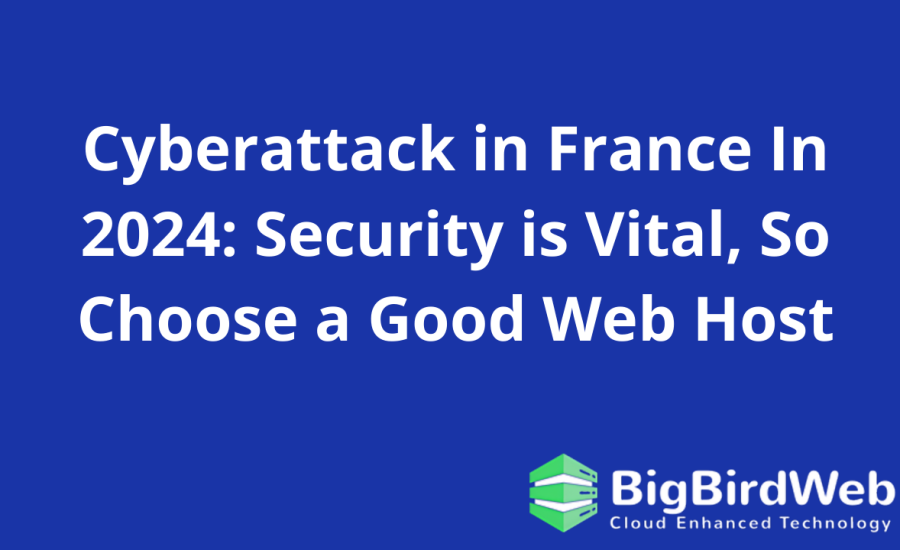Understanding the impact of a cyberattack in France and the importance of choosing a reliable web host to enhance security. In recent years, the frequency and sophistication of cyberattacks have escalated worldwide. Notably, a significant cyberattack in France has brought to light the critical need for robust cybersecurity measures. For businesses, this incident underscores the importance of choosing a reliable web host to safeguard their online presence. In this article, we’ll delve into the implications of the cyberattack in France, explore the vital role of a good web host in ensuring security, and provide guidance on selecting the right hosting provider.

Table of Contents
The Cyberattack in France: An Overview

A recent cyberattack in France targeted several high-profile organizations, leading to widespread data breaches and service disruptions. This attack, orchestrated by a sophisticated group of hackers, exposed vulnerabilities in the affected entities’ cybersecurity infrastructure. The repercussions were severe, ranging from financial losses to damaged reputations and legal consequences.
Key Impacts of the Cyberattack
- Data Breaches One of the most alarming outcomes of the cyberattack in France was the large-scale data breaches. Sensitive information, including customer data, financial records, and intellectual property, was compromised. This breach not only affected the organizations but also put individuals at risk of identity theft and fraud. For this you should go for affordable web hosting.
- Service Disruptions The attack caused significant service disruptions, rendering websites and online services inaccessible. For businesses reliant on digital operations, this downtime resulted in lost revenue and diminished customer trust.
- Financial Losses The financial implications of the cyberattack in France were substantial. Organizations faced costs associated with investigating the breach, restoring services, compensating affected individuals, and implementing enhanced security measures.
- Reputational Damage The reputational damage inflicted by the attack cannot be overstated. Customers and partners lost confidence in the affected organizations’ ability to protect their data, leading to a decline in business relationships and market value.
The Importance of Choosing a Reliable Web Host
In the wake of the cyberattack in France, the importance of selecting a reliable web host has never been more evident. A good web host plays a crucial role in fortifying your website against cyber threats and ensuring its continuous operation. Here are the key reasons why choosing a reputable web host is vital for security:
- Enhanced Security Features A reliable web host provides robust security features designed to protect your website from cyber threats. These features include firewalls, malware scanning, intrusion detection systems, and DDoS protection. By implementing these measures, a good web host can significantly reduce the risk of a successful cyberattack.
- Regular Backups Regular backups are essential for mitigating the impact of a cyberattack. A reputable web host will offer automated backup services, ensuring that your website’s data is securely stored and can be quickly restored in the event of a breach. This minimizes downtime and helps maintain business continuity.
- SSL Certificates SSL (Secure Sockets Layer) certificates are crucial for encrypting data transmitted between your website and its visitors. A good web host will provide SSL certificates, enhancing the security of sensitive information such as login credentials and payment details. This encryption is vital for protecting against data interception during a cyberattack in France or elsewhere.
- Server Maintenance and Updates Keeping server software and systems up to date is critical for defending against new vulnerabilities. A reliable web host will regularly update and maintain their servers, ensuring that security patches are applied promptly. This proactive approach helps protect your website from known exploits.
- Technical Support Access to knowledgeable technical support is invaluable when dealing with cybersecurity incidents. A reputable web host will offer 24/7 customer support to assist with any issues, including potential cyber threats. Prompt and effective support can make a significant difference in mitigating the impact of an attack.
How to Choose a Good Web Host
Selecting the right web host involves careful consideration of several factors. Here are some key criteria to evaluate when choosing a hosting provider to ensure robust security for your website:
- Security Measures Investigate the security measures offered by potential web hosts. Look for features such as firewalls, malware scanning, DDoS protection, and regular security audits. Ensure that the host provides SSL certificates and supports secure protocols.
- Backup and Recovery Confirm that the web host offers automated backup services and has a reliable recovery process in place. The ability to quickly restore your website from a backup is crucial in the aftermath of a cyberattack in France or any other security breach.
- Uptime Guarantee A high uptime guarantee indicates the reliability of the web host’s infrastructure. Look for providers that offer at least a 99.9% uptime guarantee to minimize the risk of service disruptions.
- Reputation and Reviews Research the reputation of the web host by reading customer reviews and testimonials. Look for feedback on the provider’s security practices, customer support, and overall reliability. A host with a solid reputation is more likely to deliver on their promises.
- Customer Support Ensure that the web host offers 24/7 customer support and has a team of knowledgeable technicians available to assist with security issues. The availability of prompt and effective support is crucial in responding to cyber threats.
- Scalability As your website grows, your hosting needs may evolve. Choose a web host that offers scalable solutions, allowing you to upgrade your plan as your requirements increase. This flexibility ensures that your website remains secure and performs well as traffic grows. You can also opt for free web hosting.
- Compliance with Regulations Depending on your industry, your website may need to comply with specific regulations regarding data security and privacy. Verify that the web host adheres to relevant standards, such as GDPR (General Data Protection Regulation), to ensure compliance.
FAQs
1. What is the significance of the cyberattack in France?
The cyberattack in France highlighted the vulnerabilities in cybersecurity infrastructure, leading to data breaches, service disruptions, financial losses, and reputational damage for affected organizations.
2. Why is choosing a reliable web host important for security?
A reliable web host provides enhanced security features, regular backups, SSL certificates, server maintenance, and technical support, all of which are crucial for protecting your website from cyber threats.
3. What security features should I look for in a web host?
Look for features such as firewalls, malware scanning, DDoS protection, SSL certificates, regular security audits, and automated backups. These measures help safeguard your website against cyberattacks.
4. How can regular backups mitigate the impact of a cyberattack?
Regular backups ensure that your website’s data is securely stored and can be quickly restored in the event of a breach, minimizing downtime and maintaining business continuity.
5. Why is SSL important for website security?
SSL certificates encrypt data transmitted between your website and its visitors, protecting sensitive information such as login credentials and payment details from interception during a cyberattack.
Bonus Content: Additional Tips for Enhancing Website Security
- Use Strong Passwords Ensure that all accounts associated with your website, including admin and user accounts, use strong, unique passwords. Avoid common passwords and consider using a password manager to generate and store secure passwords.
- Enable Two-Factor Authentication Two-factor authentication (2FA) adds an extra layer of security by requiring a second form of verification in addition to the password. Enable 2FA for all accounts that support it to reduce the risk of unauthorized access.
- Regularly Update Software Keep your website’s software, including content management systems (CMS), plugins, and themes, up to date. Regular updates patch security vulnerabilities and improve overall security.
- Monitor Website Activity Use monitoring tools to keep an eye on your website’s activity. Look for unusual patterns or unauthorized changes that could indicate a security breach. Early detection is key to mitigating the impact of an attack.
- Educate Your Team Train your team on cybersecurity best practices, such as recognizing phishing attempts, using secure connections, and maintaining strong password hygiene. A well-informed team is less likely to fall victim to cyber threats.
In conclusion, the cyberattack in France serves as a stark reminder of the importance of robust cybersecurity measures. Choosing a reliable web host is a critical step in safeguarding your website against cyber threats. By evaluating potential hosts based on their security features, backup and recovery processes, customer support, and scalability, you can make an informed decision that enhances the security and reliability of your online presence.
